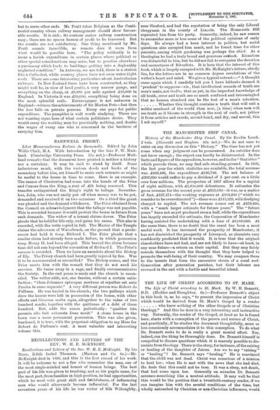THE MANCHESTER SHIP• CANAL History of the Manchester Ship Canal.
By Sir Bosdin Leech. 2 vols. (Sherratt and Hughes. 42s. net.)—We do not care to enter on any discussion on this "History." The time has not yet come when any judgment can be pronounced. An outsider does not know enough ; the expert can hardly be disinterested. In the facts and figures of the appendices, however, and in the" Statistics" which precede them, we may find safe standing-ground. In 1905, the last year for which statistics are available, the total revenue was £449,436, the expenditure .2246,746. The net balance of £202,690 would suffice to pay a dividend of 5 per cent, on a little over four millions. The prospectus of 1887 allows for a capital of eight millions, with .21,800,000 debentures. It estimates the gross revenue for the second year at £655,630—it was, as a matter of fact, .2137,474—the working expenses at £104,200 (" which we consider to be overestimated ")—these were £115,329, with dredging charged to capital. The net revenue comes out at £479,430, with a "much larger estimate for future years." The "future years" have not as yet produced even a half, while the expenditure has largely exceeded the estimate, the Corporation of Manchester having assisted the undertaking with a loan of £3,000,000. At the same time, there is no doubt that the canal has been a most useful work. It has increased the prosperity of Manchester; it has not diminished the prosperity of Liverpool, as alarmists very confidently predicted that it would. It is true that the original shareholders have not had, and are not likely to have—at least, in any near future—a return on their capital. But they may fairly console themselves with the thought that they have helped to promote the well-being of their country. We may compare them to the insects that form the successive strata of a coral reef. Generation after generation perishes, but their labours are crowned in the end with a fertile and beautiful island.






























































 Previous page
Previous page